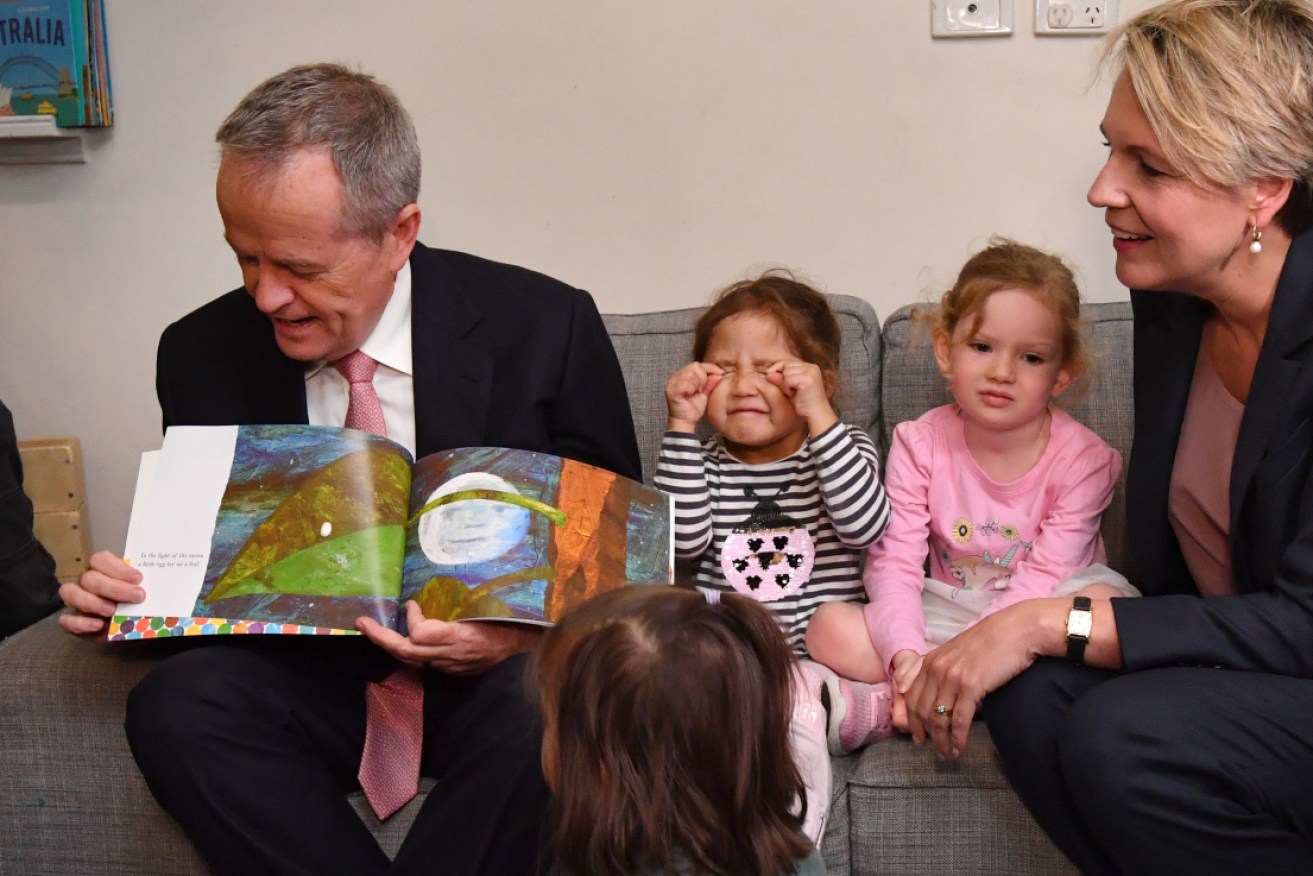The brutal truth of the 2019 federal election: No one is paying attention


Australian Opposition Leader Bill Shorten and Deputy Opposition Leader Tanya Plibersek try to hold the attention of children at the Goodstart Early Learning Centre in Perth, on April 29. Photo: AAP
We should be alarmed to learn that almost half the Australian voting public (45 per cent) is paying little or no attention to the federal election, which is now less than two weeks away.
That’s the brutal truth revealed by this week’s Essential poll, although it’s a slight improvement on the previous week’s even higher level of election disengagement (48 per cent).
Another indication that many voters have switched off from politics is that almost a million people have already lodged their votes at a pre-poll station – double the number who’d voted early at this point of the election campaign in 2016.
Prepoll votes cast in the 2019 federal election was just over 255,000 on Monday. Total prepoll is now 915,000 since early voting commenced a week ago. #ausvotes #auspol
— AEC ✏️ (@AusElectoralCom) May 6, 2019
The election’s low level of political engagement presents the major political parties with a risky choice – should they prod the beast out of its slumber, rousing disengaged voters to actually think about what is being offered by the main contenders, or should they let sleeping dogs lie, which usually results in voters relying on their gut instinct to choose a party on polling day.
Voters that can be motivated to look at the major parties’ policy offerings, which both involve major spending items, will view the policies very differently depending on whether they care if the spending is ‘affordable’.
Getting the budget back into balance is much more important to current and potential coalition voters, especially those who run businesses or work in the corporate sector and therefore have a deeper understanding of what it means to ‘balance the books’.
However it’s a very different story for current and potential Labor supporters, many of whom are low and medium wage earners who haven’t seen a decent pay rise in a very long time.
Those voters frankly don’t care whether there’s a budget surplus, how much certain initiatives will cost, or if an exact price tag can’t be attached to a policy. They just want to see their wages increase, their costs kept under control, and the government delivering high-quality health and education.
These are the people that Labor leader Bill Shorten is trying to connect with when he claims: “If Scott Morrison says Australia can’t afford it, he’s saying you don’t deserve it.”
Mr Shorten’s quip encapsulates the voter perception that Labor has been at pains to create in recent years – that it will have overflowing Treasury coffers, thanks to the savings made from restricting negative gearing, abolishing refunds for franking dividends, and scrapping tax cuts for ‘the top end of town’.

The audience declared Bill Shorten the winner of the first debate.
Even though Labor claims it will have enough revenue to also bring the budget back into surplus, this is not the alternative government’s main message.
If voters take little more from Mr Shorten appearing on the news every night, Labor wants it to be the message that a Shorten Labor government ‘has a lot of money to spend on the issues that matter to you’.
What of those voters who don’t or won’t engage at all with the election campaign or politics more broadly? It remains their democratic – and legal – duty to at least go through the motions of voting on election day.

A voter enjoys a sausage sizzle on election day. Photo: AAP
Some will place a blank ballot in the box, while others will embellish their voting slips with images or words of protest (before taking a snapshot for their followers on Instagram).
However the vast majority of the disengaged, which could be anywhere from 16 per cent to 29 per cent of voters according to this week’s Essential poll, will vote by habit or by instinct.
They’ll either vote for the party they’ve always supported, or they’ll go with the party – or party leader – they instinctively trust to do the right thing by the nation.
Trust of this kind is a strange beast, because it exists alongside voters’ belief that politicians are generally dishonest and only in it for themselves.
It might not be based on facts or experience, and it can be influenced by things as superficial as a party leader’s appearance or their obnoxious and unescapable yellow billboards.
It’s certainly fair to say that disengaged (and uninformed) voters get the government they deserve, but the problem is that the rest of the nation is saddled with that government too. It’s in everyone’s interest to identify and resolve the reasons why this disengagement occurs in the first place.
Reducing the pre-poll period is not a solution, despite being peddled by party representatives, when the real issue is the bad behaviour of politicians and the overwhelmingly antagonistic nature of politics more broadly.
Failure to address this problem will lead to even more disengaged voters in future elections, which could mean even more uninformed votes being influenced by those bilious yellow billboards.








